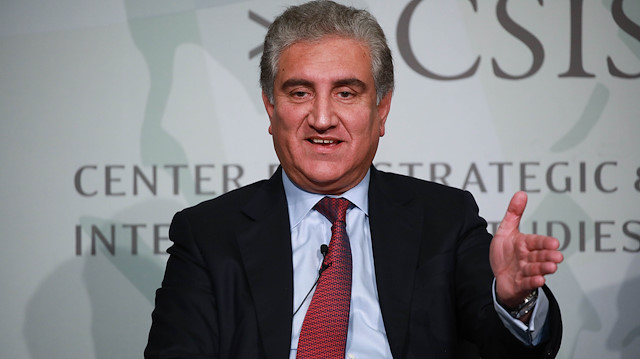
If Kashmir issue is not addressed, crisis there has the potential to become a flashpoint between India and Pakistan
Pakistani Foreign Minister Shah Mahmood Qureshi used an event Thursday hosted by a think tank in Washington, D.C. to call attention to the plight of the Kashmiri people, who have been under severe restrictions for the past several months.
Speaking at a discussion held by the Center for Strategic and International Studies, Qureshi said India has been seeking to break the will of Kashmiris by imprisoning them in their homes and imposing a communications blockade.
"Thousands of Kashmiris, particularly young boys, have been imprisoned, tortured. Even children as young as nine have not been spared," he said.
Earlier in the day, Qureshi met with the leadership of the U.S. Senate Foreign Relations Committee at Capitol Hill, including Senators James Risch, Bob Menendez, Mitt Romney and Chris Murphy.
They discussed the U.S.-Pakistan bilateral relationship, the situation in South Asia, the Afghan peace process and recent developments in the Middle East.
During the talks, Qureshi briefed the U.S. lawmakers on India's lockdown in occupied Jammu and Kashmir and its implications for regional security.
In his address at the panel, he said if the Kashmir issue is not addressed, the crisis in Kashmir has the potential to become a flashpoint between the two countries with strategic capabilities.
He said the Indian narrative that Kashmir is an internal part of India is firmly refuted by being on the UN Security Council agenda.
He also disputed India’s argument that it is improving the economic development of the Kashmiri people, calling it "bizarre".
"Yes, economic development is being delivered at gunpoint by over 900,000 occupation troops," said Qureshi.
He also recalled that Pakistani Prime Minister Imran Khan warned the international community about the "fascist" ideology of the Bharatiya Janata Party (BJP) when the Kashmir crisis escalated in August.
"Initially, some of our friends felt we were exaggerating the situation, and now everybody recognizes that," he said, adding "the mask has slipped and the reality of [Indian Prime Minister Narendra] Modi's world view is fully exposed."
He said the suspension of internet services in "occupied Kashmir is the longest ever imposed by a democracy."
"The passage of the citizen amendment act and the national register of citizens is raising fundamental questions about the ideals of democracy and secularism that India's founding fathers advocated," he added.
He warned that "Indian state terrorism and oppression of Indian occupied Jammu and Kashmir and BJP government incitement of religious hatred and frenzy in India have dangerous implications for the region.”
"Let's not forget this Indian government has a history of externalizing its domestic problems," he added.
The foreign minister said Pakistan needs peace to focus on achieving its domestic agenda for economic reform and development.
Jammu and Kashmir has been under continuous lockdown since Aug. 5 last year when India scrapped provisions of Article 370 of its Constitution that provided a certain degree of autonomy and protected the region’s demographic character.
India and Pakistan both hold Kashmir in parts and claim it in full. China also controls part of the contested region, but it is India and Pakistan which have fought two wars over Kashmir.
Hello, the comments you share on our site are a valuable resource for other users. Please respect other users and different opinions. Do not use rude, offensive, derogatory, or discriminatory language.
The floor is all yours.








